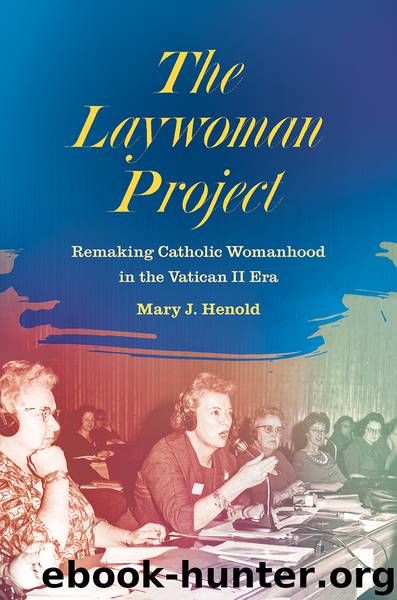The Laywoman Project by Mary J. Henold

Author:Mary J. Henold
Language: eng
Format: epub
Publisher: The University of North Carolina Press
Published: 2020-06-14T16:00:00+00:00
Essentialism
Let’s begin with the question of what writers at the time termed “sex-role stereotyping.” The affirmative case in the debate over this question, basically essentialism, has already been outlined, but what of the other side? By the midpoint of the 1960s, Catholic laywomen had had ample exposure in the national media to criticism of female essentialism, not only through the publication of Betty Friedan’s The Feminine Mystique (which was widely reviewed, if skeptically, in Catholic periodicals, including Marriage) but also through other available feminist writings and coverage of the growing movement. What’s more, educated and active Catholic laywomen would also likely have been aware of debates over women’s equality that had begun to creep into Catholic circles through the Catholic feminist movement, then in its first phase. We know that any reader of Marriage who was also active in her NCCW affiliate would have been exposed to such ideas through the NCCW’s national publications. The question was whether anyone would speak up in this forum, which was male-dominated and dedicated to strengthening Catholic couples. The answer is yes, and it is in this debate that laywomen’s voices begin to emerge in revealing ways.
“I’m a housewife (or should I say homemaker) and mother of four, and I am tired of hearing of the glories of motherhood. ‘Motherhood’—that golden word that is supposed to make us glow. . . . I’m one of those mothers that just doesn’t ‘glow.’ Biologically, I’m a mother, but psychologically I might have been better fitted at anything else.” Marge Morton did not glow, and she did not care who knew it. Similarly, Lucille Harper told a story of a friend whom she considered very “sacrificial,” and it worried her. “She wants to excel as a woman, and to be considered feminine, which in her mind means to give beyond endurance. . . . Giving to the point of exhaustion isn’t feminine, it’s life-shortening.” Here were two laywomen willing to state boldly, without qualifiers, what to this point was taboo: “natural” traits were anything but, and they could lead to psychological and physical harm for the Catholic women who attempted to conform to them.26
Perhaps for these reasons, and a host of others, it became increasingly normal to hear laywomen call for an end to sex-role stereotyping in the pages of Marriage. For instance, early Catholic feminist and philosopher Rosemary Lauer took aim at those who believed that a college education was wasted on Catholic wives because they would never use it in their role as mothers. “First of all,” she began, “such a viewpoint presupposes that a woman can attain the complete development of her personality simply by being a wife and mother—a conviction that made sense only as long as theology professors could teach with a straight face the Aristotelian doctrine that ‘men attain their perfection by developing their intellects; women attain theirs by bearing children.’” When she was finished with the theologians, she targeted another venerable institution a little closer to home for Marriage: “One
Download
This site does not store any files on its server. We only index and link to content provided by other sites. Please contact the content providers to delete copyright contents if any and email us, we'll remove relevant links or contents immediately.
| Civilization & Culture | Expeditions & Discoveries |
| Jewish | Maritime History & Piracy |
| Religious | Slavery & Emancipation |
| Women in History |
Cecilia; Or, Memoirs of an Heiress — Volume 1 by Fanny Burney(32558)
Cecilia; Or, Memoirs of an Heiress — Volume 2 by Fanny Burney(31956)
Cecilia; Or, Memoirs of an Heiress — Volume 3 by Fanny Burney(31942)
The Secret History by Donna Tartt(19092)
Sapiens: A Brief History of Humankind by Yuval Noah Harari(14389)
Leonardo da Vinci by Walter Isaacson(13337)
The Radium Girls by Kate Moore(12028)
Sapiens by Yuval Noah Harari(5372)
How Democracies Die by Steven Levitsky & Daniel Ziblatt(5219)
The Wind in My Hair by Masih Alinejad(5095)
Homo Deus: A Brief History of Tomorrow by Yuval Noah Harari(4918)
Endurance: Shackleton's Incredible Voyage by Alfred Lansing(4783)
Man's Search for Meaning by Viktor Frankl(4607)
The Silk Roads by Peter Frankopan(4534)
Millionaire: The Philanderer, Gambler, and Duelist Who Invented Modern Finance by Janet Gleeson(4478)
The Rape of Nanking by Iris Chang(4213)
Joan of Arc by Mary Gordon(4113)
The Motorcycle Diaries by Ernesto Che Guevara(4102)
Stalin by Stephen Kotkin(3968)
